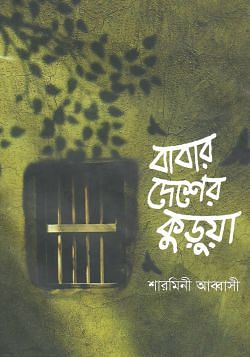The tears of women
The tears of women
Nashid Kamal reads of birdsong in tradition

IN South Asian traditional societies, women get married to leave their natal homes.
They either live with the extended families of their husbands, or live in nuclear families, becoming the household head by default. This role of raising kids, dispensing traditional roles of being a daughter in law to the husband's family, being a perfect employee at work, juggling parents and their aging process, becomes a herculean task. Amidst this, often women yearn to be the daughter in their parents' home. They recall and reminisce on the carefree, blissful times spent in their own surroundings.
This is the subject of the book, artfully titled Babar Desher Kurua, an obvious legacy from a bhawaiyya song, from the rich heritage that Sharmini Abbasi bears in being the grand daughter of the late Abbasuddin Ahmed. During the times when Abbasuddin Ahmed achieved his fame, the kurua bird was the symbol of a messenger from the father's native land. A fragment of imagination allows the bird to travel long distances and tell the tales of yearning and suffering which the woman is going through in her in- laws' home, in some other village, far removed from where she was.
Sharmini Abbasi has only moved from Hiraman Manzil in Purana Paltan, Dhaka to a flat in Gulshan. Geographically, the distance means very little, but the gap in the times, the perceptions, the morality of the late 1970s and that of today spark out in the penmanship of the author. Abbasi's writing style has always been very alluring; she brings out a novelty in her writing style which turns very simple events into interesting ones. For example, her times spent with the aging grandmother, who talks about coke, while her grandchildren are talking about 'cocaine' is enjoyable to all.
Raised by the connoisseur of folk music, Mustafa Zaman Abbasi and Asma Abbasi, Sharmini Abbasi finds discord in her Gulshan life. In Gulshan life, Agora, PQs, Meenabazaar surround her with pricy objects, yet the simplicity of buying a toy for credit from a vendor in Purana Paltan reminds her of the mercenary atmosphere in which the children are growing up. They do not know their neighbours, they are part of the rat race, they hear about Porsche cars and Singapore trips from their classmates.
The author has an inimitable writing style which makes her ideas very easily understood. For example, she writes 'Ek baganer phul shomule tule onno matir shinchone ropito hoye shei shob ochena jhor brishti tufaner tandob shesheo shei pushper moton mayera, kade na'. She stands out among contemporary writers for her writing style. Her phrasing of adjectives or use of imagery is remarkable. For example, she describes her aunt Ferdausi Rahman as crisp as nescafe. Who would attribute such a figure of speech to a legendary figure whom most people would refer to as a 'symbol of poise and dignity' or phrases like 'evergreen and well dressed'?
Although the book ekes out with the suppressed sorrows of the woman's soft heart, the final lines are positive '..porisheshe chondralokito bhora purnimay akashey billol shoshi shamne krishno ronger oleek ka'baa-Belali azaan baje prokompito kore snayu moddho rater shesh bhage tawaf korchi hat dhore meye are baba……..kurua ja ebar tui,ichha moton shukher geet ga, dukho bole kichu nei'.
She tells women to come to terms with whatever they have and accept reality as well as the memorable, enjoyable situations that life has also offered in the newness of it all.
Sharmini's concept of using words and describing situations definitely makes her 'first among the equals', as she sets her own writing style, repeatedly telling the kurua bird, 'Babar desher kurua chhara are kauke je bolte nei. Tui kintu kauke bolish na, dukkho korish na, shona chan pakhi, dukkho chhara je kono shongeet shompurno na'. This is where she achieves universality in her writing. The fact that even today, among privileged families, with sophisticated dress and higher education from Western universities, women's sorrow and cries are the same as those from a humbler background, or from different times. Sharmini Abbasi's easy flowing prose reminds me of a three hour long solo drama by Treepti Mitra. It was all engrossing and the characters, even though invisible, were clear and lucid from her narration, and of course, never a dull moment!
Dr. Nashid Kamal is an academic and leading Nazrul exponent